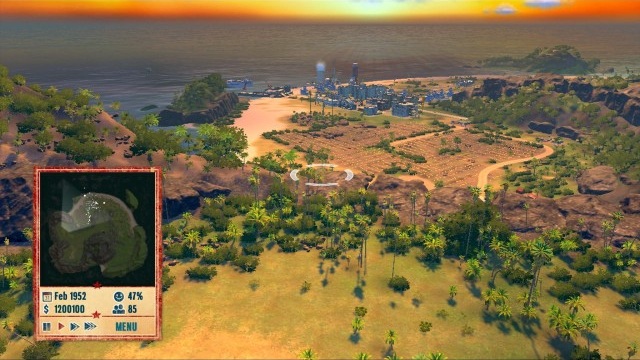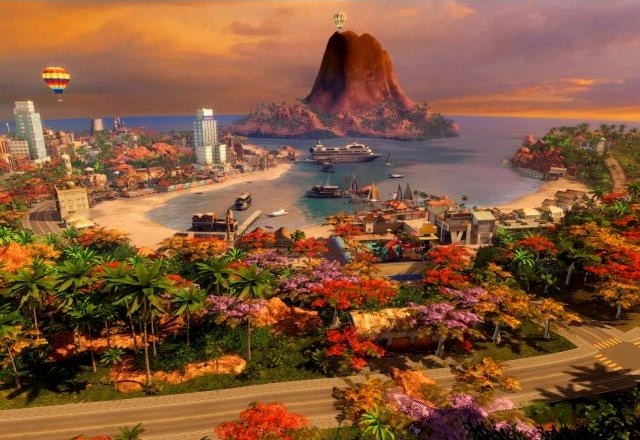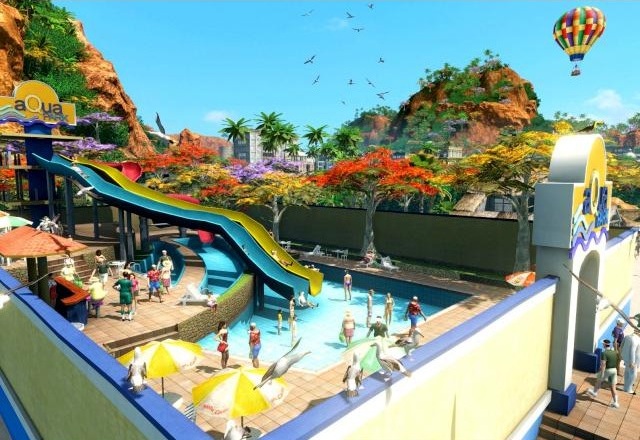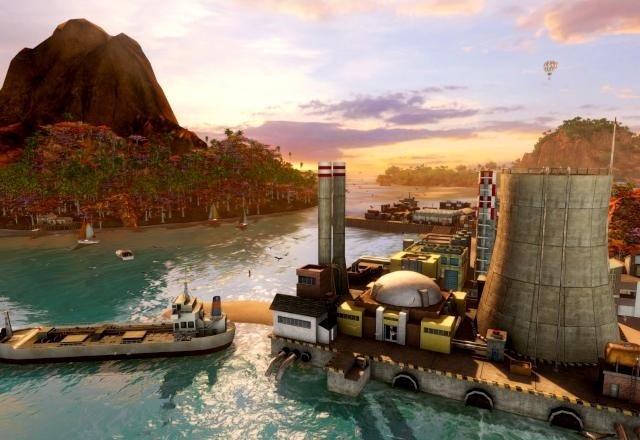Vote El Presidente—or he’ll just take away your right to anyway.
I figured with the many hours of my life spent playing other simulation games (variations of The Sims, namely), I was more or less prepared for Tropico 4. The political simulation aspect didn’t ring any warning bells—how hard can it be to rule as a dictator, anyway?
Tropico 4 allows the player to become the “much loved” dictator, El Presidente, while managing the welfare of several different islands. Equal parts building and political simulator, there is a lot more strategy and complexity than I had anticipated. Keeping the citizens of Tropico safe, happy, and healthy while simultaneous padding your Swiss Bank Account is no easy task!
The avatar for El Presidente is customizable, with three different traits resulting in various in-game effects. Being “Well Travelled” gives you a better tourism rating and better relations with foreign nations, while being “Ugly” lowers the respect of Tropicans, but gives you better relations with the Middle East (can anyone come up with a non-offensive explanation for that one?). The avatar’s “Background” and “Rise to Power” have similar effects, both good and bad.
The four mini-tutorials available adequately prepared me to begin playing, but didn’t quite prepare me for just how complicated things get. In a matter of minutes, after blowing through all my money in the treasury and watching the overall happiness of the population plummet, I knew it was serious business time.
Besides providing adequate housing, healthcare, and food, each citizen belongs to a different faction (out of eight) with different wants and needs that must be satisfied—that is, if you don’t want them to rebel. Often, these values conflict with other factions: the Intellectuals don’t like when the local high school is set to religious curriculum, but the Religious faction is very pleased; Militarists want a huge army, but Loyalists don’t want elections to be allowed, and so on.
Luckily, the Almanac is a handy guide to find out what exactly it is Tropicans want and need. The higher the level of happiness, the fewer problems you’re likely to run into—rebellion, strikes, protests. In the Almanac, you can also check on your foreign relations, imports and exports, as well as lists of Tropicans based on age, wages, level of respect, etc. Without the Almanac, El Presidente would be horribly lost.

Every official decision made by El Presidente is scrutinized by the citizens of Tropico as well. “Silencing” rebels might be a good way to stay in power temporarily, but you can bet someone is going to be upset. Issuing the “Food for the People” edict will make Communists happy, but the local Capitalists are outraged by your gesture of kindness. I was a fool to think everyone likes free food, apparently.
Depending upon what percent of the population belongs to any given faction, a certain amount of pandering must be done to ensure the majority of the population is pleased. Though if relations get too bad with any group, there are a variety of interesting repercussions as well. For instance, the Capitalists can ensure the cost of your exports drops by 20% if they are unhappy. Jerks.
Foreign relations are also incredibly important, since you don’t want to be invaded or denied financial aid in times of need. When a tsunami or hurricane hits your island, you want the cash to flow to you with equal force. Often, it’s impossible to make decisions without pissing off at least one other foreign power, which is yet another thing to juggle during your rule. Policies, trade, and the amount of money in your treasury all effects how well you get on with other nations. If you’re in debt, you can bet you won’t be making any friends.
Generating ample income is one of the biggest challenges in Tropico, especially since all the citizens get free healthcare, education, and religion (silly Communists!). Exporting goods such as smoked beef from ranches, spiced rum from your tricked out distillery, or importing logs to build furniture to sell is one of the best sources of income.

The tourism industry can also a good source of cash, but your island had better have a lovely environment and plenty of entertainment to bring those cargo short-clad suckers in. Taking on tasks assigned by other nations is the best bet—sometimes they want more goods or simply push their agenda on you and your citizens. If you’re lucky, they’ll be plenty of cash for your personal stash as well.
Aside from everything that needs to be managed, there are unexpected setbacks in the form of natural disasters, price drops for random commodities, absurd demands (I couldn’t bring myself to burn books to satisfy religious zealots even in a game), workers going on strike, the threat of invasion from rebels and outside forces, and plain old poor management.
Even with things occasionally getting completely ruined, though, the routine does tend to get dull. There are 20 different missions to complete, there isn’t quite enough diversity in goals to keep things spicy. Early on in the missions, I found myself reaching goals and “winning” just as I was really getting into it. Later on, I found it nearly impossible to succeed, even with all my experience ruling Tropico. Maybe I’m just not cut out for politics?
Tropico 4 has a great soundtrack of mostly instrumental and upbeat Latin jams, so you can maintain that carefree island attitude even when the treasury is negative at least six digits. Unfortunately, the dozen or so songs on the soundtrack are not nearly enough to cover the many hours spent micro-managing your islands. The music can always be muted, but I found myself wanting more songs instead. I guess El Presidente’s attitude rubbed off onto me, over time.

The graphics aren’t anything amazing to look at, the gameplay is occasionally dull and headache-inducing, and the voice acting is weak and annoying at times. Overall, though, Tropico 4 is enjoyable, if only because of the satisfaction that comes with virtually and successfully ruling a nation while getting rich. Actually, it’s a bit like a really elaborate Communist Farmville, which shouldn’t be—but absolutely is—awfully addicting.
After trying to please an entire population in terms of food, entertainment, healthcare, housing, crime safety, religious satisfaction, environment, and military (and the list goes on), I can almost sympathize with politicians. Almost—until I remember their massive salaries, and the fact that one doesn’t come a politician by chance.
Viva El Presidente!
-
Highly complex
-
Equally challenging and entertaining
-
Can be tryingly repetitive
-
Less-than-amazing graphics and voice acting
-
Sweet soundtrack, not enough songs







